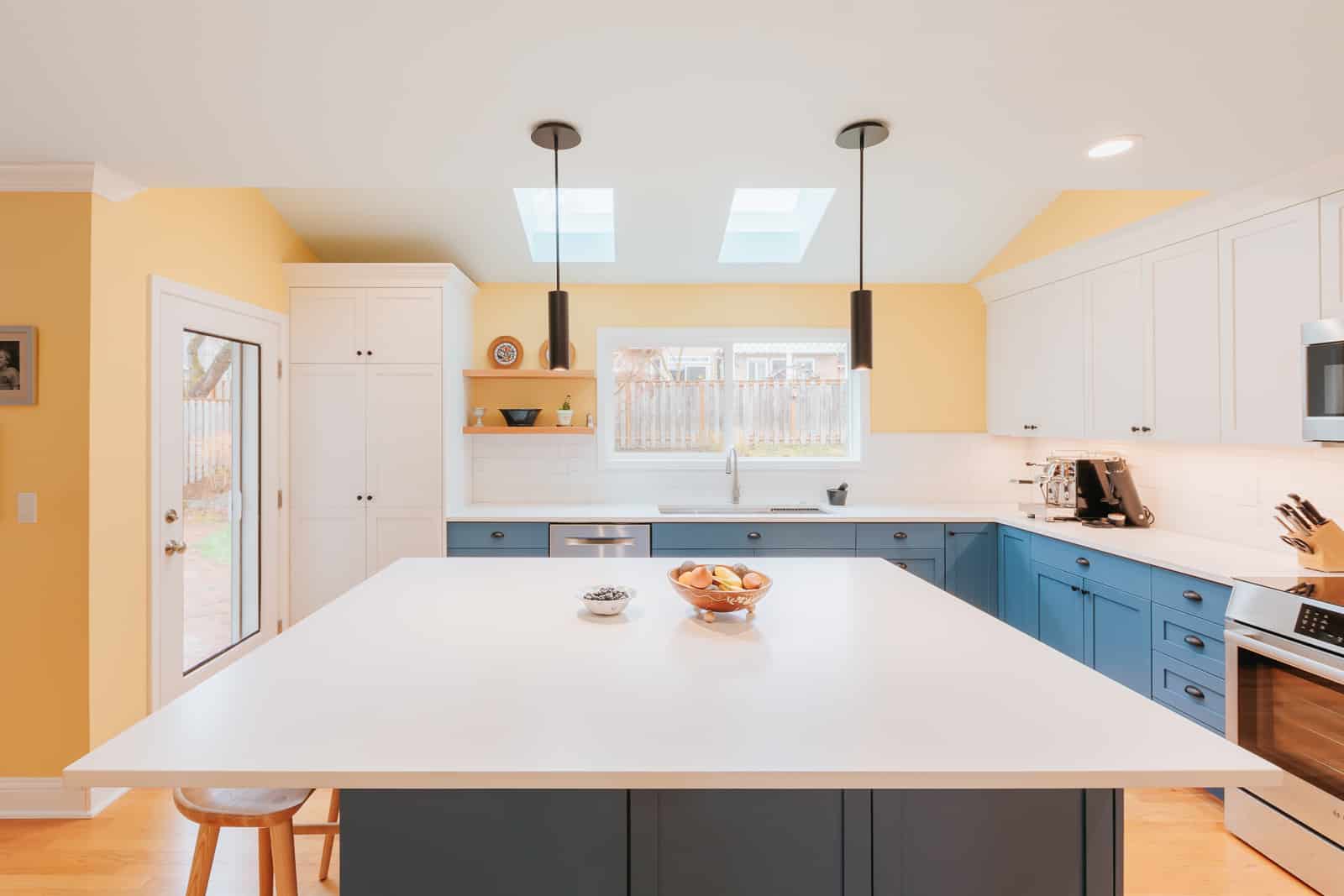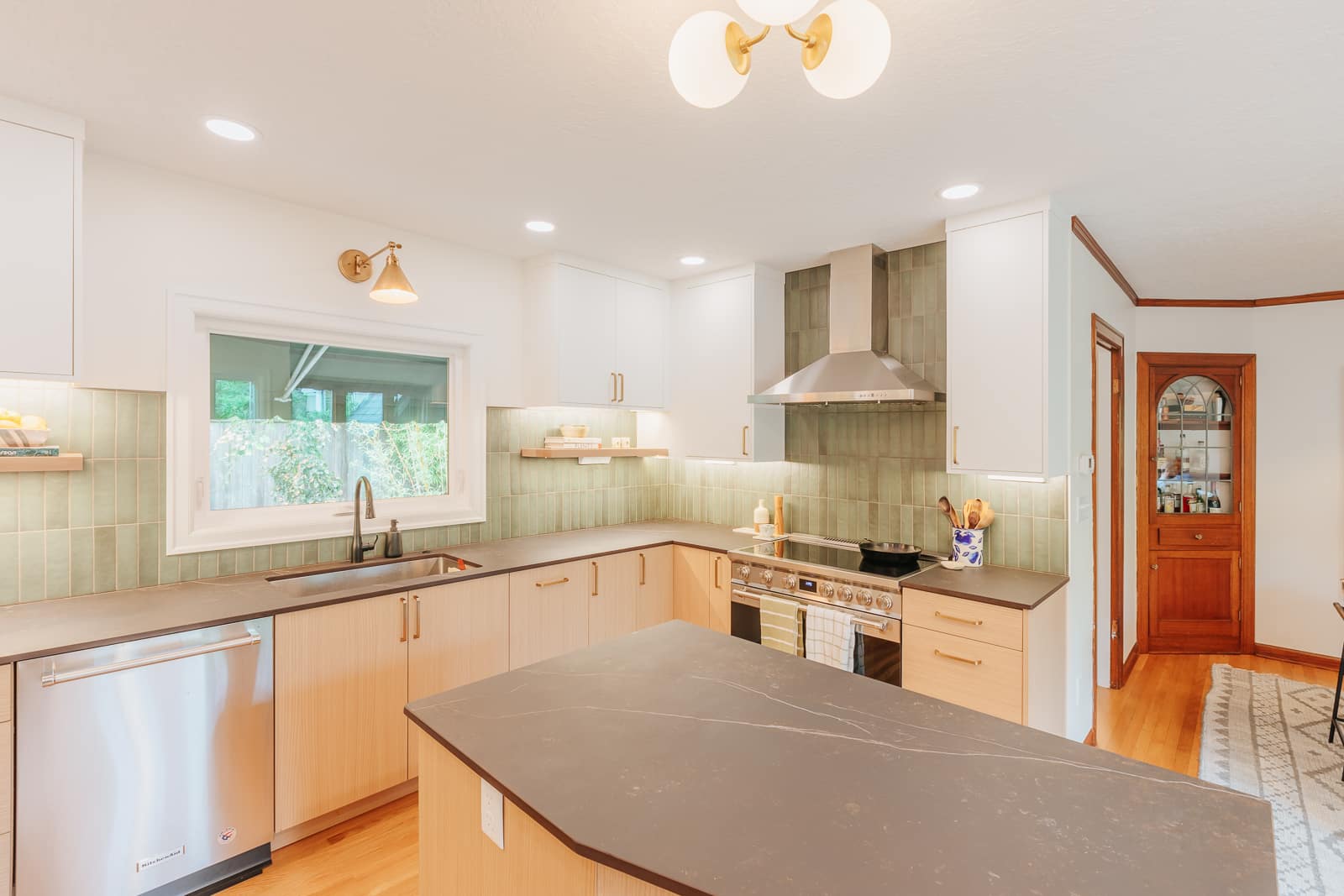In the last few decades, engineered countertop materials have become well-liked among homeowners for their durability and resemblance to natural stone. Two standout contenders in this category are engineered quartz and Dekton, each boasting a unique set of qualities that cater to different tastes and requirements.
At Lamont Bros. Design & Construction, we’ve seen firsthand the impact these materials can have on the overall aesthetic and design functionality of a kitchen. With many years of experience guiding homeowners through the process of kitchen remodeling, our team is well-versed in both quartz and Dekton countertops.
The purpose of this article is to illuminate the distinct characteristics of quartz and Dekton countertops. Whether you prefer the classic allure of quartz or the innovative edge of Dekton, this comparison will provide you with a comprehensive understanding to make an informed choice for your remodel. The specific areas we’ll explore include:
Quartz: The Original Engineered Countertop
First introduced in the 1960s, quartz became a popular for kitchen countertops in the 1990s and early 2000s. Although often mistaken for natural stone, quartz is in fact a blend of crushed quartz (90-95%) crystals and polymer resins (5-10%). The resulting slab creates a surface that rivals the beauty of natural stone with the enhanced functional qualities of engineered materials.
Quartz countertops have long stood the test of time as a preferred choice for homeowners and designers alike. They are liked both for their aesthetic appeal, durability, and low-maintenance. As a longstanding product in the countertop market, quartz is widely accessible. A wide range of global suppliers offer quartz products in a rich array of colors and patterns to suit any design palette.
From subtle monochromes to elaborate designs with intricate color veining, the selection is vast and varied, ensuring that there’s something for every taste and project. This widespread availability is coupled with a reputation built over years of use in various settings, from bustling kitchens to elegant bathrooms, making quartz a trusted and time-honored option in the world of countertops.

Pros of Quartz Countertops
Lots of Options: Quartz offers an extensive range of options due to the many manufacturers, each of which produces a variety of colors and styles. This variety allows homeowners to find the perfect match for their aesthetic preferences and design needs.
Standardized Installation: As a common countertop material, most countertop fabricators are familiar with installing quartz. This relatively standard installation process means it’s often quicker and easier to find a qualified installer.
Tried and Tested Material: Quartz has been a popular choice for years, proving itself as a durable and reliable material since the mid-20th century. Its longevity in the market reflects its ability to withstand the wear and tear of everyday use while maintaining its aesthetic appeal.
Cons of Quartz Countertops
Susceptible to Heat: Quartz countertops can be damaged by high temperatures. Hot pans and appliances can melt the resin binders in quartz slabs, leading to cracks, warping, or discoloration. It’s important to use trivets and hot pads to protect the surface.
UV Damage: Prolonged exposure to direct sunlight can cause quartz to fade or discolor over time. This is particularly a concern for areas near windows or outdoor installations, where the UV rays are more intense.
Uses Plastic as a Binding Agent: The polymer resins used as a binding agent in quartz are essentially plastic. This can be a downside for those seeking entirely natural materials or aiming for a lower environmental impact.
Dekton: Modern Countertop Technology
Introduced by Cosentino in 2013, Dekton has quickly gained a reputation as a revolutionary countertop material. Dekton is an ultra-compact countertop surface created from a blend of raw materials including glass, porcelain, and quartz. This mixture undergoes a process called particle sintering, which uses high heat and pressure to combine loose particles into a solid mass. Think of it like making a snowball — you’re taking thousands of individual snowflakes and pressing them into one solid shape.
Dekton offers a diverse palette of colors and textures. From sleek monochromes to intricate patterns resembling marble or wood, their offerings cater to a wide array of design preferences. Dekton’s rapid rise to fame in the countertop market is a testament to its unique properties and versatility. Despite being newer to the market than quartz, Dekton has carved out a niche for itself. Many people favor Dekton for its remarkable resistance to UV rays, scratches, stains, and heat. This makes it not just ideal for indoor kitchens and bathrooms but also for outdoor settings, where its durability stands up to the elements.

Pros of Dekton Countertops:
Extremely Durable: Dekton is known for its incredible strength and durability. It’s resistant to heat, scratches, stains, and UV damage, making it an ideal surface for both indoor and outdoor use. Its resilience ensures a long-lasting, pristine appearance under various conditions.
Slab Thickness Options: One of the unique advantages of Dekton is its availability in multiple thicknesses, ranging from slim 4 mm to robust 30 mm. This variety allows for a wide range of design applications.
No Plastic Binding Agents: Unlike quartz, Dekton does not use any polymer resins or plastic binding agents in its composition. This results in a completely inorganic and environmentally friendly product, which is an important consideration for eco-conscious consumers.
Cons of Dekton Countertops
Visual Limitations: Although made of natural materials, Dekton does have some limitations when it comes to its appearance. Specifically, the veining or marbling pattern on the surface of the slab does not continue through the edges or cutouts on a slab. This means that along the outside edges and any inside sink cutouts, the edge will have a solid color rather than feature the same pattern as the surface.
New Product: Although rapidly gaining in popularity, Dekton hasn’t been on the market as long as other engineered materials like quartz. It doesn’t have as extensive a track record, which means its long-term performance and durability in various environments are not as widely documented or tested.
Difficult to Install: Dekton’s unique composition and hardness can make it more challenging to cut and install than more common materials like quartz or granite. It requires specialized tools and skills, which not all contractors possess. Additionally, its weight and brittleness demand careful handling to avoid damage during transport and installation.
Choosing Between Quartz and Dekton Countertops
When deciding between Quartz and Dekton for your countertops, several key factors should guide your choice. Both materials have their unique advantages and potential drawbacks, so considering your specific needs, lifestyle, and design preferences is crucial. Here are some points of discussion to help you make an informed decision:
Consider Your Budget
Quartz offers a wider range of price points, making it accessible for various budgets. If cost-effectiveness is a priority, you may find more options with quartz.
Dekton generally comes at a higher price point. Its advanced technology and durable properties are reflected in its cost. Consider if the additional benefits justify the expense for your specific needs.
Assess Usage and Location
If you’re looking for countertops that will face high heat or direct sunlight, Dekton’s superior heat and UV resistance make it an excellent choice, especially for outdoor kitchens or sunny areas.
For indoor use, where the focus is more on aesthetics and ease of maintenance, quartz with its vast design options and standardized installation might be more suitable.
Installation Considerations:
Dekton requires specialized tools and skills for installation due to its unique composition and hardness. It’s important to ensure that your installer has experience with Dekton to avoid any installation issues.
Quartz is more commonly used and understood by countertop fabricators, potentially making the installation process smoother and possibly less expensive.
Environmental and Health Considerations:
If you prefer a countertop material without any plastic components, Dekton’s absence of polymer resins might be more appealing. It’s completely inorganic, which might also align better with eco-friendly preferences.
Quartz uses polymer resins as a binding agent, which can be a downside for those aiming for a lower environmental impact or who are concerned about the potential health implications of plastics.
Longevity and Performance:
While both materials are durable, Dekton’s newer technology hasn’t been as widely tested or used as quartz over decades. Consider whether a tried and tested material or a newer, potentially more advanced one aligns with your long-term expectations.
Ready to Learn More About Kitchen Remodeling?
Now that you understand more about the differences between quartz and Dekton countertops, take the next step in your research. Download our free Kitchen Remodel Buyer’s Guide. In it, you’ll find insights and advice from remodeling experts to help you plan and construct a kitchen remodel that meets your needs.
Want to talk to a designer to learn more about your kitchen remodeling options? Click the button below to schedule a free meeting with a member of our design team. We’ll help you explore all of your kitchen remodeling dreams and ideas to help you turn your current kitchen into the kitchen of your dreams.



